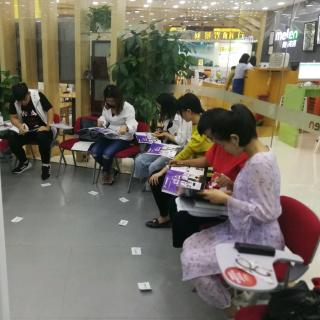
介绍:
【EM1-LP10 My Routine 】 Meten, Longhua Center, SZ, LT: Yoga Yu
(先完成个小目标,把EM1录完吧!😊)亲爱的听众朋友们大家好,这里是Yoga的荔枝电台FM799839,我是美联深圳龙华中心的LT Yoga,在这里为大家播讲新M1的LP10 My Routine的课程,欢迎您的收听,希望通过我们的节目,你能够对本课有更好的预习和复习,让我们开始学习吧!
Unit Goals of Unit10: 教学目标:
(1) Describe your daily schedule; 描述你的日程表;(2) Explain how often things happen; 阐述事情发生的频率;(3) Talk about your weekend; 聊聊你的周末;
【Words and phrases: 单词和短语:】
(1)课文里的单词和短语:daily routine日常生活,日常工作,millions of成千上万的,数百万的,形容很多,by subway乘坐地铁,after school 放学后,math数学, interesting adj有趣的;test n 测试, difficult adj 困难的, choose v 选择, nervous adj 紧张的, excited adj 感觉激动的, the night before前一天晚上, my first day of class我第一天上课。
(2)日常活动词汇:get up late 晚起床,take a shower洗澡,get dressed穿衣服,go to
school上学,go to work 工作, start school 开始上学,go to class去上课, finish school 放学,go home回家,do homework做作业,have swim practice 练习游泳,finish practice完成练习,play video games 玩电子游戏,read comic books 读漫画书, have an appointment有约, study in a café 在咖啡馆学习, choose my clothes挑选我的衣服, check my backpack检查书包, go to bed early早睡;
(3)频度副词: always永远,总是,usually通常,often常常,sometimes 有时候, never从不;
(4)其他词汇:adverb副词,write each action 写出每一个动作,do the action 做动作,
the first correct answer第一个正确的答案,repeat step3 重复第三个步骤,adverbs of frequency 频度副词, the words come after be这些词放在be动词后面, the words come before other verbs, 这些词放在其他动词前面;
2.【Sentences: 句子;】
(1)询问星期的句子:
1)—What day is it today? 今天星期几?
—Today is Wednesday. 今天星期三。
2)—What day is it tomorrow?明天星期几?
—Tomorrow is Thursday.明天是周四。
3)—What’s your favorite day of the week? 你最喜欢一周中的哪天?
—My favorite day is Tuesday. 我最喜欢周二。
4) —In your country, when is the weekend?在你们国家,哪天是周末?
—In my country, weekends are Saturday and Sunday.在我们国家,周末是周六和周日。
(2) 询问日常活动的句子:
1) —What do you usually do in the morning? 在早上你经常做什么?
—I usually get up early,have breakfast and go to work. 我通常早起,吃早饭并且去上班。
2) —What does she often do on Monday?她通常在周一做什么?
—She often goes to school, has classes and has swim practice. 她周一常去上学,上课和练习游泳。
(3) 询问频度的句子:
—How often do you go to Meten?你多久去一次美联呢?
—I often go to Meten. 我经常去。/ I go to Meten two times a week.我一周去两次。
—How often does he watch a movie? 他多久看一部电影呢?
—He watches movies twice a month. 他一个月看电影两次。
—Do you often go shopping on the weekend? 你常常周末去购物吗?
—No, I don’t, I often play video games with friends. 不,不会,我总是跟朋友打电游。
—Does she always go to the gym on Sundays?她总是在周日去健身房吗?
—No, she doesn’t, she always goes to a club on Sundays.不,她不会,她总是在周日去俱乐部。
【Dialogues: 对话】关于询问日常活动的对话;
Bill:I’m so happy it’s Friday! I need a break. 我好开心,周五啦,我需要休息一下。
Nadia:Yeah, me too. What do you usually do on the weekend, Bill? 是的,我也是,你通常在周末做什么?Bill?
Bill:Not much. I get up late. Sometimes, I see my friends. What about you? 不做什么,我起床很晚,有时候,去看朋友,你呢?
Nadia:Oh, I’m really busy. I have a class on Saturday morning. Then I work on Saturday afternoon. On Sunday, I do homework. 哦,我很忙,我周六上午有一节课,然后周六下午我工作,周日我要做作业。
Bill: Wow, you are busy! 哇,你真忙呀!
4.【Grammar】: 频度副词、短语用法
一般现在时常常与always, usually, often, sometimes, seldom, hardly, never等频度副词连用,表示动作发生的频率。这些频度副词按发生频率的高低依次为:
always100%→usually80%→often60%→sometimes20%→seldom5%→hardly3%→never0%
频度副词在句中的位置比较灵活,但通常放在行为动词之前,系动词、情态动词或助动词之后。
1. always 意为“总是,一直”,这是频率最高的词,表示动作反复,状态持续,不间断。其反义词是never,意为“从不”。如果要变为否定句,应将always改为never才能全部否定。另外,当always与进行时态连用时,常表示“总是”,带有厌烦、不满或赞美等感情色彩。如: Li Ping is always late for school. 李平上学总是迟到。
Li Ping is never late for school. 李平上学从不迟到。(全部否定)
Li Ping is not always late for school. 李平上学不总是迟到。(部分否定)
The boy is always asking for money. 这个小男孩总是要钱。(表厌烦)
2. usually 意为“通常”,表示习惯性动作或状态,很少例外。如:
We usually go to school at seven in the morning. 我们通常在早上七点上学。
My mother and I usually go shopping on Sundays. 我和妈妈通常在星期天去买东西。
3. often 意为“经常,时常”,表示反复性的动作或状态,中间有间断。其反义词是seldom, 意为“很少,不常”。often在句尾时常被very或quite修饰。如:
The boys often eat noodles and the girls sometimes eat them. 男生经常吃面条,女生有时吃。
I often chat with my friends under the big tree. 我经常在这棵大树下和朋友聊天。
He writes to his friends quite often. 他常给他的朋友写信。
4. sometimes 意为“有时”,表示动作偶尔发生,间隔较长。其位置比较灵活,放在句首、句中、句末都可。如:
Sometimes we go to the cinema and at other times we go for a walk. 有时我们去看电影,有时我们去散步。
I sometimes watch TV in the evening. 我有时晚上看电视。
My father has lunch in the factory sometimes. 我父亲有时在工厂吃午饭。
5. seldom 意为“很少,不常”,表示否定意义。
如: The little girl seldom goes out. 这个小女孩很少外出。
He seldom gives his wife a present, does he? 他不常给妻子送礼物,是吗?
6. hardly 具有否定意义,表示“几乎不、简直不”,除非特殊情况,否则不会发生。如:
The boy is so young that he could hardly understand it. 这个孩子太小了,不可能懂得这件事。
7. never 意为“从来不,从来没有”,也表示否定意义,它表示从未发生的动作或情况,没有例外。如: The boys never eat chocolate and the girls seldom eat it. 男生从不吃巧克力,女生很少吃。
*另外,once a year (每年一次), twice a week (每周两次), three times a day (一天三次), every Saturday afternoon(每星期六下午)等,这些时间状语也表示频率,它们可以和频度副词用在同一个句子中,表达上没有重复。如: We usually go to the cinema four times a month.我们通常一个月去电影院四次。
对这些频度副词或短语进行提问,都用疑问词how often,表示“每(隔)多长时间做一次”的意思。如:——How often do you go to see a movie in a cinema? 你多就去电影院看一次电影呀?—— I go to see a movie in a cinema twice a month . 我一月去两次哦。

